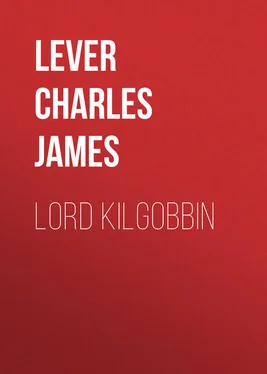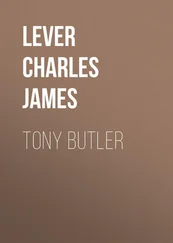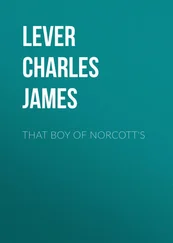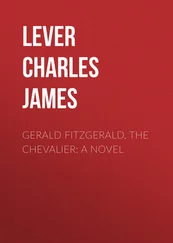Charles Lever - Lord Kilgobbin
Здесь есть возможность читать онлайн «Charles Lever - Lord Kilgobbin» — ознакомительный отрывок электронной книги совершенно бесплатно, а после прочтения отрывка купить полную версию. В некоторых случаях можно слушать аудио, скачать через торрент в формате fb2 и присутствует краткое содержание. Жанр: literature_19, foreign_antique, foreign_prose, на английском языке. Описание произведения, (предисловие) а так же отзывы посетителей доступны на портале библиотеки ЛибКат.
- Название:Lord Kilgobbin
- Автор:
- Жанр:
- Год:неизвестен
- ISBN:нет данных
- Рейтинг книги:3 / 5. Голосов: 1
-
Избранное:Добавить в избранное
- Отзывы:
-
Ваша оценка:
- 60
- 1
- 2
- 3
- 4
- 5
Lord Kilgobbin: краткое содержание, описание и аннотация
Предлагаем к чтению аннотацию, описание, краткое содержание или предисловие (зависит от того, что написал сам автор книги «Lord Kilgobbin»). Если вы не нашли необходимую информацию о книге — напишите в комментариях, мы постараемся отыскать её.
Lord Kilgobbin — читать онлайн ознакомительный отрывок
Ниже представлен текст книги, разбитый по страницам. Система сохранения места последней прочитанной страницы, позволяет с удобством читать онлайн бесплатно книгу «Lord Kilgobbin», без необходимости каждый раз заново искать на чём Вы остановились. Поставьте закладку, и сможете в любой момент перейти на страницу, на которой закончили чтение.
Интервал:
Закладка:
‘I am very grateful for this interest; but will you kindly say what is the version my friend Dick has given of me? what are the lights that have fallen upon my humble character?’
‘Do you fancy that either of us have time at this moment to open so large a question? Would not the estimate of Mr. Joseph Atlee be another mode of discussing the times we live in, and the young gentlemen, more or less ambitious, who want to influence them? would not the question embrace everything, from the difficulties of Ireland to the puzzling embarrassments of a clever young man who has everything in his favour in life, except the only thing that makes life worth living for?’
‘You mean fortune – money?’
‘Of course I mean money. What is so powerless as poverty? do I not know it – not of yesterday, or the day before, but for many a long year? What so helpless, what so jarring to temper, so dangerous to all principle, and so subversive of all dignity? I can afford to say these things, and you can afford to hear them, for there is a sort of brotherhood between us. We claim the same land for our origin. Whatever our birthplace, we are both Bohemians!’
She held out her hand as she spoke, and with such an air of cordiality and frankness that Joe caught the spirit of the action at once, and, bending over, pressed his lips to it, as he said, ‘I seal the bargain.’
‘And swear to it?’
‘I swear to it,’ cried he.
‘There, that is enough. Let us go back, or rather, let me go back alone. I will tell them I have seen you, and heard of your approaching departure.’
CHAPTER XVI
A visit to his father was not usually one of those things that young Kearney either speculated on with pleasure beforehand, or much enjoyed when it came. Certain measures of decorum, and some still more pressing necessities of economy, required that he should pass some months of every year at home; but they were always seasons looked forward to with a mild terror, and when the time drew nigh, met with a species of dogged, fierce resolution that certainly did not serve to lighten the burden of the infliction; and though Kate’s experience of this temper was not varied by any exceptions, she would still go on looking with pleasure for the time of his visit, and plotting innumerable little schemes for enjoyment while he should remain. The first day or two after his arrival usually went over pleasantly enough. Dick came back full of his town life, and its amusements; and Kate was quite satisfied to accept gaiety at second-hand. He had so much to tell of balls, picnics, charming rides in the Phoenix, of garden-parties in the beautiful environs of Dublin, or more pretentious entertainments, which took the shape of excursions to Bray or Killiney, that she came at last to learn all his friends and acquaintances by name, and never confounded the stately beauties that he worshipped afar off with the ‘awfully jolly girls’ whom he flirted with quite irresponsibly. She knew, too, all about his male companions, from the flash young fellow-commoner from Downshire, who had a saddle-horse and a mounted groom waiting for him every day after morning lecture, down to that scampish Joe Atlee, with whose scrapes and eccentricities he filled many an idle hour.
Independently of her gift as a good listener, Kate would very willingly have heard all Dick’s adventures and descriptions not only twice but tenth-told; just as the child listens with unwearied attention to the fairy-tale whose end he is well aware of, but still likes the little detail falling fresh upon his ear, so would this young girl make him go over some narratives she knew by heart, and would not suffer him to omit the slightest incident or most trifling circumstance that heightened the history of the story.
As to Dick, however, the dull monotony of the daily life, the small and vulgar interests of the house or the farm, which formed the only topics, the undergrowl of economy that ran through every conversation, as though penuriousness was the great object of existence – but, perhaps more than all these together, the early hours – so overcame him that he at first became low-spirited, and then sulky, seldom appearing save at meal-times, and certainly contributing little to the pleasure of the meeting; so that at last, though she might not easily have been brought to the confession, Kate Kearney saw the time of Dick’s departure approach without regret, and was actually glad to be relieved from that terror of a rupture between her father and her brother of which not a day passed without a menace.
Like all men who aspire to something in Ireland, Kearney desired to see his son a barrister; for great as are the rewards of that high career, they are not the fascinations which appeal most strongly to the squirearchy, who love to think that a country gentleman may know a little law and be never the richer for it – may have acquired a profession, and yet never know what was a client or what a fee.
That Kearney of Kilgobbin Castle should be reduced to tramping his way down the Bachelor’s Walk to the Four Courts, with a stuff bag carried behind him, was not to be thought of; but there were so many positions in life, so many situations for which that gifted creature the barrister of six years’ standing was alone eligible, that Kearney was very anxious his son should be qualified to accept that £1000 or £1800 a year which a gentleman could hold without any shadow upon his capacity, or the slightest reflection on his industry.
Dick Kearney, however, had not only been living a very gay life in town, but, to avail himself of a variety of those flattering attentions which this interested world bestows by preference on men of some pretension, had let it be believed that he was the heir to a very considerable estate, and, by great probability, also to a title. To have admitted that he thought it necessary to follow any career at all, would have been to abdicate these pretensions, and so he evaded that question of the law in all discussions with his father, sometimes affecting to say he had not made up his mind, or that he had scruples of conscience about a barrister’s calling, or that he doubted whether the Bar of Ireland was not, like most high institutions, going to be abolished by Act of Parliament, and all the litigation of the land be done by deputy in Westminster Hall.
On the morning after the visitors took their departure from Kilgobbin, old Kearney, who usually relapsed from any exercise of hospitality into a more than ordinary amount of parsimony, sat thinking over the various economies by which the domestic budget could be squared, and after a very long séance with old Gill, in which the question of raising some rents and diminishing certain bounties was discussed, he sent up the steward to Mr. Richard’s room to say he wanted to speak to him.
Dick at the time of the message was stretched full length on a sofa, smoking a meerschaum, and speculating how it was that the ‘swells’ took to Joe Atlee, and what they saw in that confounded snob, instead of himself. Having in a degree satisfied himself that Atlee’s success was all owing to his intense and outrageous flattery, he was startled from his reverie by the servant’s entrance.
‘How is he this morning, Tim?’ asked he, with a knowing look. ‘Is he fierce – is there anything up – have the heifers been passing the night in the wheat, or has any one come over from Moate with a bill?’
‘No, sir, none of them; but his blood’s up about something. Ould Gill is gone down the stair swearing like mad, and Miss Kate is down the road with a face like a turkey-cock.’
‘I think you’d better say I was out, Tim – that you couldn’t find me in my room.’
‘I daren’t, sir. He saw that little Skye terrier of yours below, and he said to me, “Mr. Dick is sure to be at home; tell him I want him immediately.”’
Читать дальшеИнтервал:
Закладка:
Похожие книги на «Lord Kilgobbin»
Представляем Вашему вниманию похожие книги на «Lord Kilgobbin» списком для выбора. Мы отобрали схожую по названию и смыслу литературу в надежде предоставить читателям больше вариантов отыскать новые, интересные, ещё непрочитанные произведения.
Обсуждение, отзывы о книге «Lord Kilgobbin» и просто собственные мнения читателей. Оставьте ваши комментарии, напишите, что Вы думаете о произведении, его смысле или главных героях. Укажите что конкретно понравилось, а что нет, и почему Вы так считаете.












